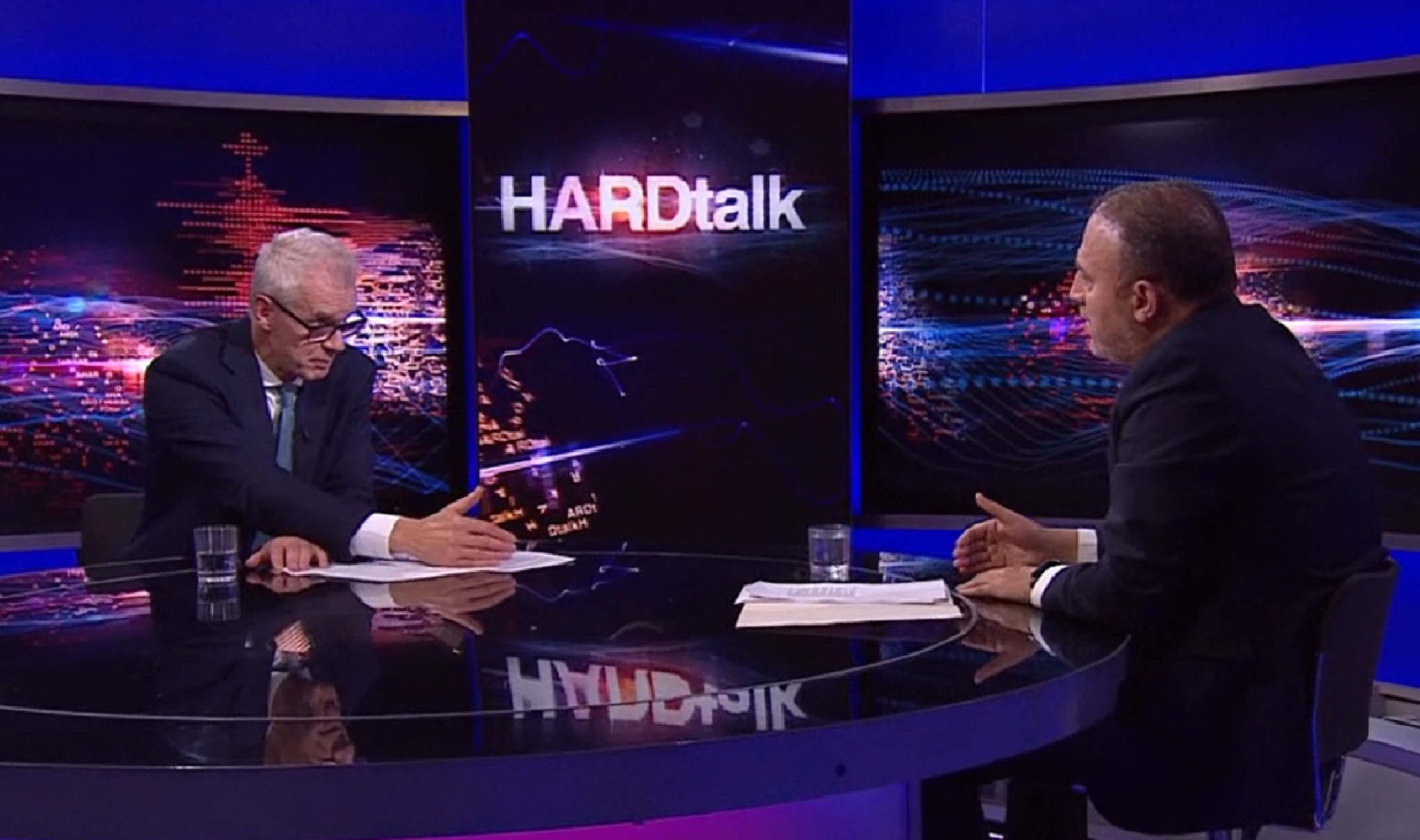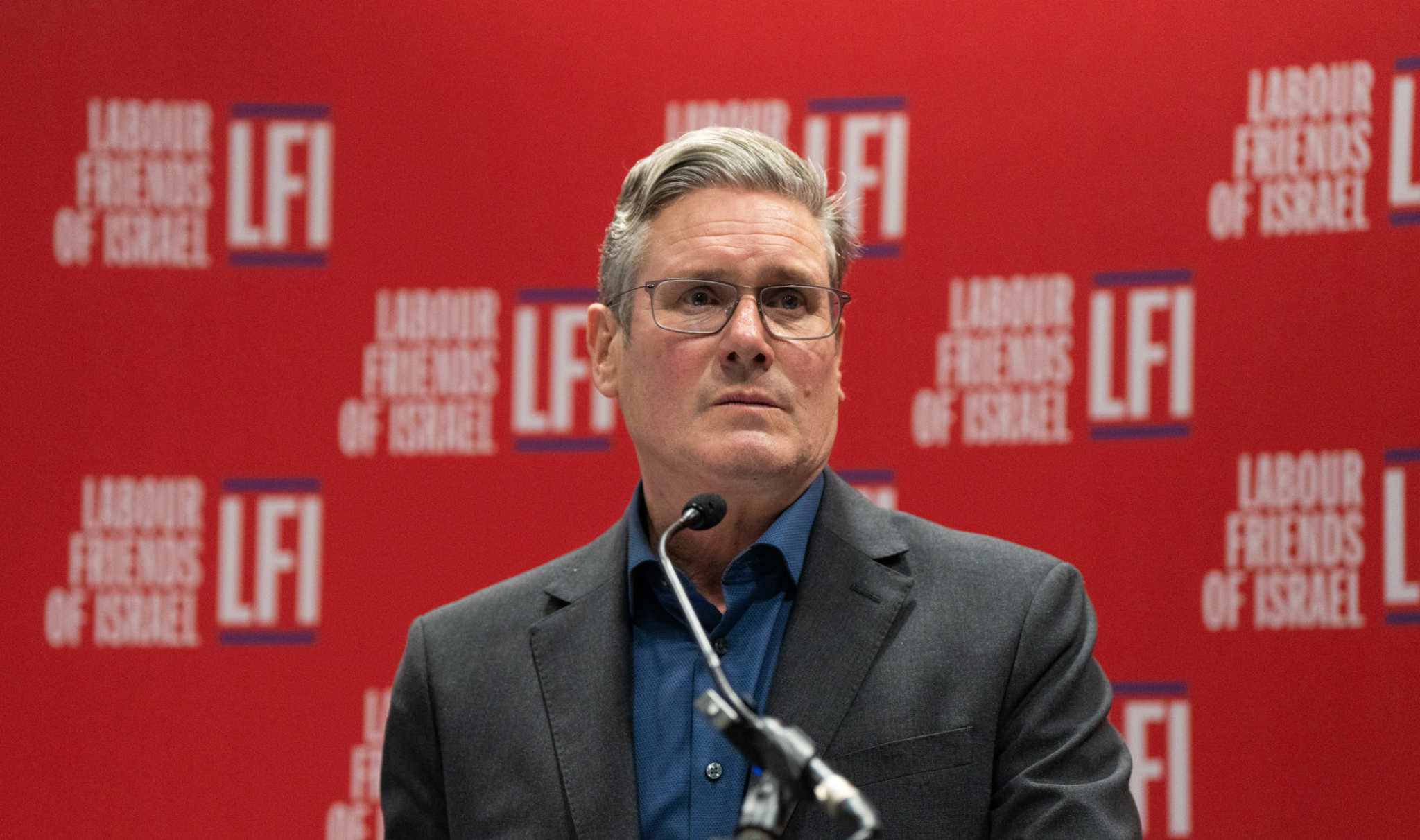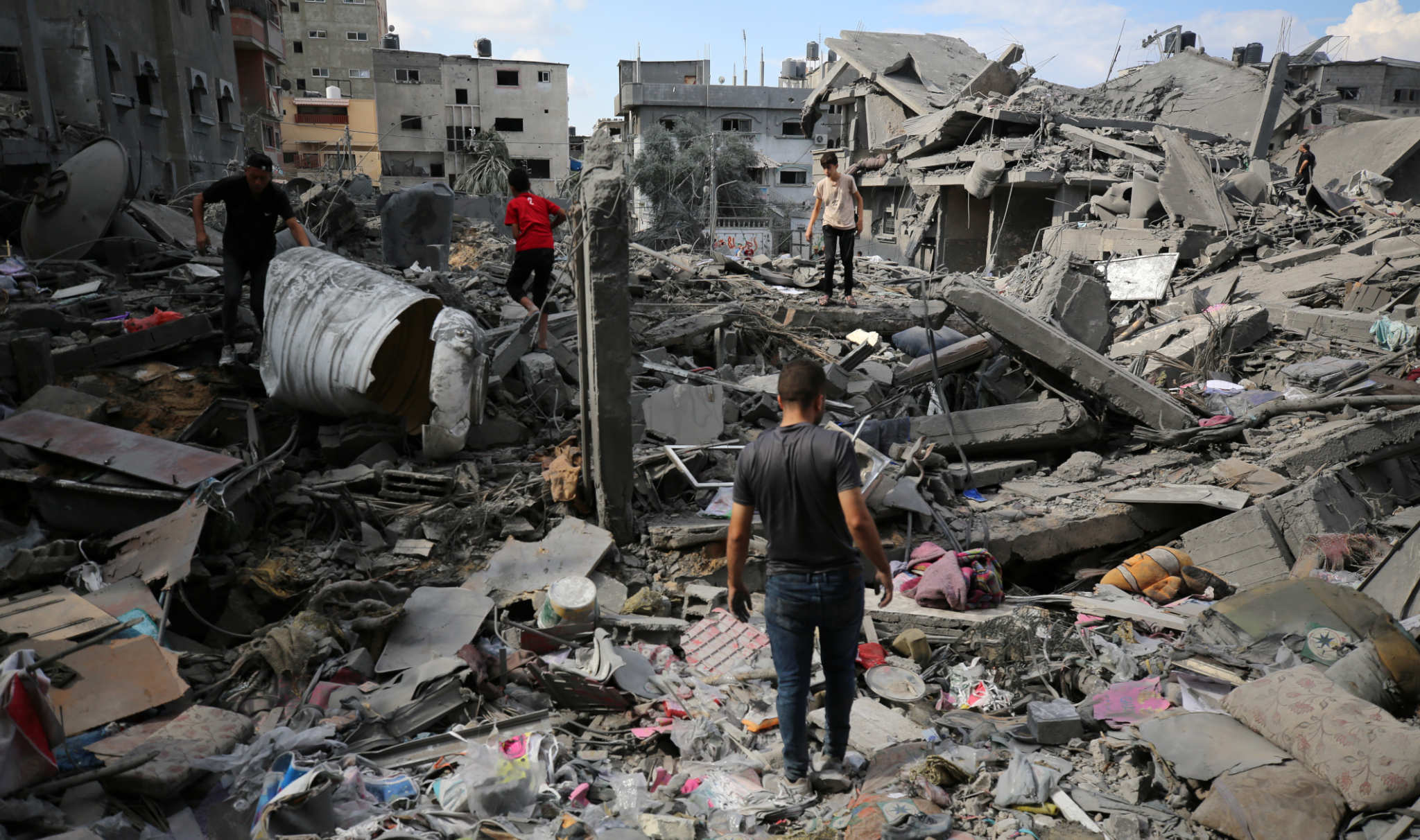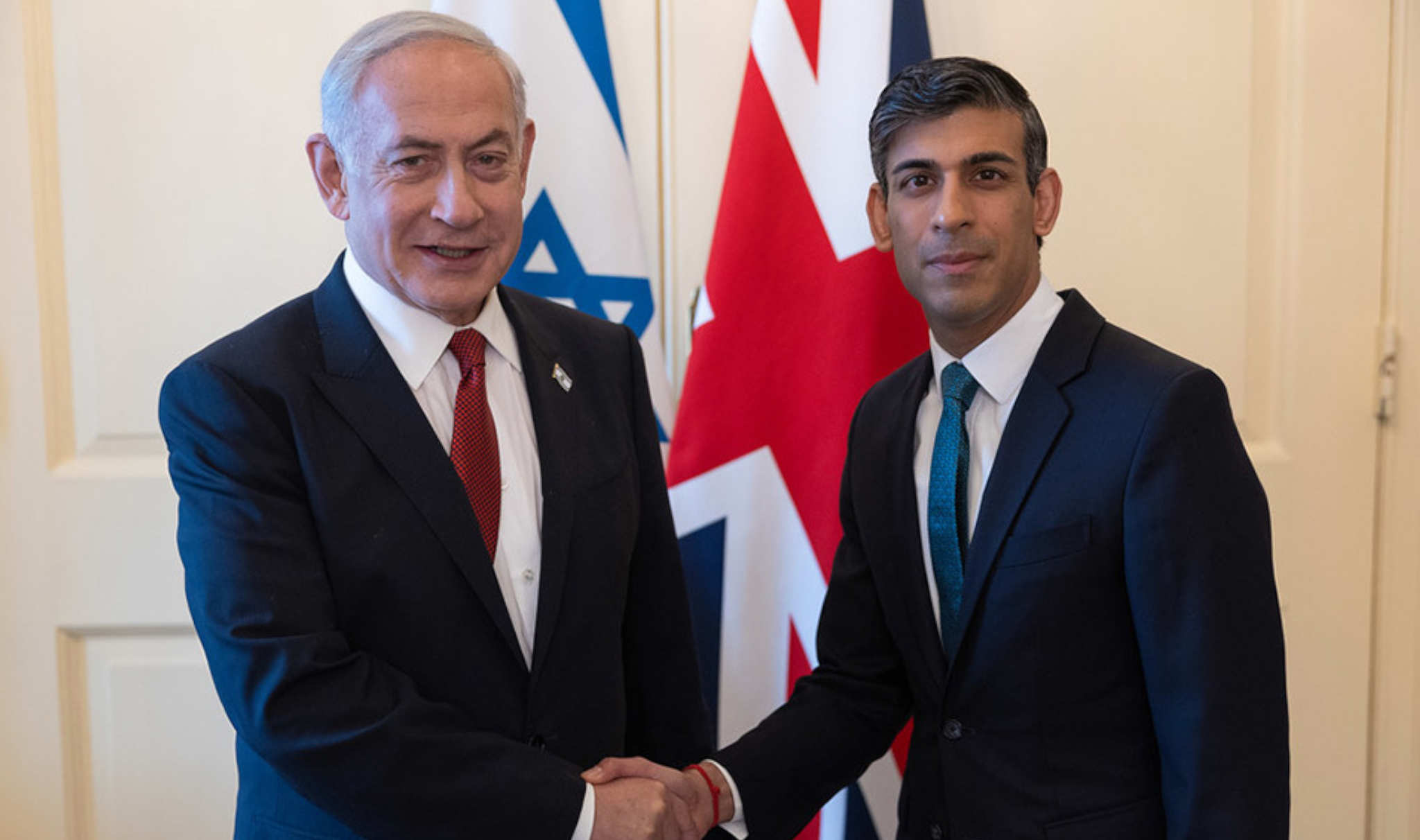“Do you condemn Hamas?”
It’s the line that nearly every Palestinian guest or commentator on broadcast television has been asked.
Husam Zomlot, Palestine’s ambassador to the UK, must be sick of the question. It doesn’t matter who the owner of the broadcaster is or who it is aligned with. Pretty much every Palestinian guest has experienced the same line of questioning.
The Rupert Murdoch-owned Talk TV hosted by Iraq-war opposing Piers Morgan asked it of rapper and activist Lowkey and academic Mohammad Hijab. The supposedly neutral public broadcaster BBC asked it of Husam Zomlot.
So too did the apparent broadcasting heavyweights LBC and Sky of Zomlot and other Palestinian guests.
Each managing editor and director general of the respective broadcasters would argue they are not like the other. However, they have certainly been singing from the same genocide-enabling hymn sheet for the last few weeks.
The specific question in and of itself is revealing. Palestinians are not Hamas. But lumping the two together, whether intentionally or not, undeniably perpetuates the narrative that Israel is adopting that sees all civilians in Gaza as legitimate targets.
In the words of Israel’s President Herzog: “It is an entire nation out there that is responsible”.
When that is the starting point, it becomes unsurprising – though no less gut wrenching – when Israel destroys 42% of housing units in Gaza and carpet bombs a refugee camp.
Equal grilling?
An instinctive counter argument of those who might consider the British media ecosystem as characterised by fearless journalism that holds power to account is to claim that both Palestinian and Israeli representatives who are platformed are given an equal grilling.
To date, former Israeli prime ministers, other ministers and military spokespeople have all featured on British screens. But none has been asked to condemn Israel’s remorselessness in Gaza, which experts have called a textbook case of genocide.
Palestinians will insist that it confirms our long-held instinct; that our lives are not worth mourning, that our murder is fair game.
BBC Newsnight provided indisputable evidence to regrettably reinforce that notion. When Husam Zomlot outlined that six of his family members were killed by Israel’s bombing of Gaza, the host barely flinched and instead pushed for an answer about whether he condones the killing of Israeli civilians.
There was no attempt to hide the hierarchy of human life and where Palestinians have been relegated to.
To subscribe to the school of thought that the British media is a just story teller that occasionally gets its approach wrong, is erroneous. At worst, it is complicit in Israel’s war crimes. At best, it deliberately misinforms and delegitimises the Palestinian struggle.
‘From the river to the sea’
The extent of this has been crystallised recently. “From the river to the sea” is a chant that has been used by Palestinians for decades, which at its heart articulates an aspiration of total Palestinian liberation from Israel’s colonial domination and apartheid rule.
But there has been a robust attempt to discredit its application. From Nick Ferrari on LBC to Krishnan Guru-Murthy on Channel 4, the director of the Palestine Solidarity Campaign, Ben Jamal, has been aggressively grilled about its meaning.
Where will the Israelis go when Palestinians expel them? How can supporters of Palestine consciously endorse this call for the systematic expulsion of Israelis and the destruction of the sole Jewish state?
Palestinians are invited on to shows not to be heard or interviewed but to be interrogated. Those were the words of Palestinian writer and activist Muhammad El-Kurd. They have never carried more weight.
There is nothing scrupulous or forensic about the fixation on the implications of the phrase from the river to the sea. Because if that was the case, the gaze of the media would be firmly planted elsewhere: at the founding charter of Benjamin Netanyahu’s ruling Likud party.
It specifies that “between the sea and Jordan there will only be Israeli sovereignty.”
If the unambiguous insinuation that the slogan is a rallying cry for the expulsion and extermination of a people, why then are Israeli officials not also pressed about it?
Indeed, an Israeli government that receives $3.3bn in arms and $500m for missile defence from the United States and has already massacred nearly 9,000 Palestinians should be confronted on what its intentions are in Gaza.
Even more so as it emerges that the Israeli Ministry of Intelligence is gearing up for the forcible and permanent transfer of Gaza’s 2.2m population.
Likud slogan
There is something sinister at play when tangible evidence exists to illustrate Israel is in real time carrying out the systematic ethnic cleansing of Palestinians, exactly as its officials promised, but the media presses Palestinians on whether or not they have such aspirations.
Mark Regev is an adviser to Benjamin Netanyahu. Tzipi Hotovely is the ambassador of the Israeli government to the UK. Both are afforded significant airtime. Why then are they not asked about the slogan in the Likud Party’s charter?
Maybe because that would provide some vital context to viewers and hold Israeli officials to account for their atrocities.
It might even lead the presenters to ask why more than 200 Palestinians were murdered in the West Bank long before 7 October. Perhaps the follow up could be to question why Palestinians continue to be slaughtered and forcibly expelled there, where there is little to no Hamas influence or power.
And yet this overlooking of relevant information or the omitting of context is a feature and not a bug of the coverage thus far.
Commentator and radio presenter Iain Dale appeared on morning television arguing that there was indeed a solution to the humanitarian catastrophe in Gaza. All Hamas had to do was hand back the hostages and the siege would be lifted.
Was that the weeks old “complete siege” and strangling of the “human animals” that Israel imposed, or the one that had been imposed since 2007 by Israel which left 80% of residents in need of international aid, two-thirds in poverty, and an unemployment rate of 45% in what was deemed an open-air prison?
Bombing refugees
Such takes which downplay and whitewash Israel’s massacres have become commonplace.
Whether it’s shadow foreign secretary David Lammy claiming it can be “legally justifiable” for Israel to bomb a refugee camp, or deputy prime minister Oliver Dowden stating Israel is abiding by international law.
The avalanche of evidence should make it straightforward to challenge the absurdity of such claims, but there is seldom any robust rebuffing.
And if it’s not ahistorical and risible stances being platformed, the tried and tested playbook of trivialising language is turned to.
The BBC delivered a crash course in precisely that. As news was filtering through of Israel pummelling the Jabalia refugee camp, its Breaking News account on Twitter first described it as “dozens reported killed in an explosion”, even as reports suggested 100 Palestinians had been murdered.
Another headline later in the evening read that “Israel confirms it carried out a deadly air strike, and says it killed a senior Hamas commander”.
First, the passive voice was used which left the question of who is responsible up in the air. Then the BBC echoed the narrative transmitted by the Israeli army in a way that justifies the wiping out of an entire community.
Never mind that 18 members of the family of an Al Jazeera broadcast engineer were murdered in the bombing. Never mind that a father lost all three of his children. A senior Hamas commander was allegedly killed and that is the important nugget of information.
Look out of the window
“If someone says it’s raining and another person says it’s dry, it’s not your job to quote them both”, goes a quote often attributed to journalism professor Jonathan Foster. “Your job is to look out of the window and find out which is true.”
Actually, one should look out the window, see flattened communities, displaced Palestinians and thousands of murdered innocent Palestinian children but still parrot Israel’s narrative anyway.
That’s real journalism. Certainly, that’s what can be extrapolated from the mainstream media’s coverage of Israel’s genocide in Gaza.
There are some who will suggest it is cautious and neutral journalism. Moral cowardice is perhaps a more apt term.
And yet a strong case can be made that the propaganda efforts are not working on the public to the same degree.
Despite the media’s best attempt at providing cover for Israel’s massacre and thereby prolonging the misery of Palestinians, polls show 76% of the UK adult population favour a ceasefire.
That, added with half a million protestors in London demonstrating in solidarity with the Palestinians and other acts of collective resistance, indicates the dominant narrative is no longer being accepted.
To describe it as a silver lining would be inconsiderate because there is not a shred of good that is emerging from the genocide in Gaza. But if it reflects that the mainstream media’s attempt at polluting minds is waning, that isn’t a particularly bad thing either.





